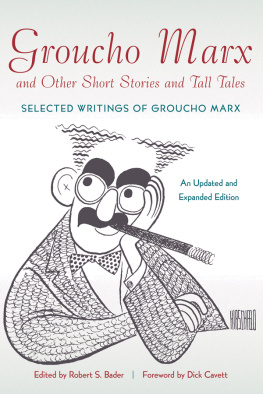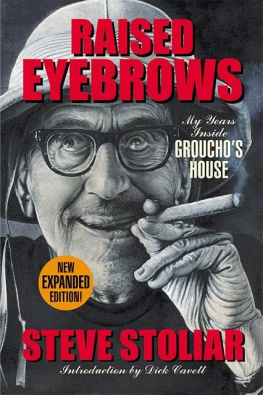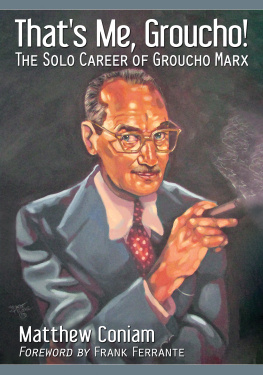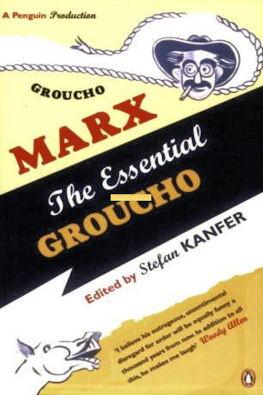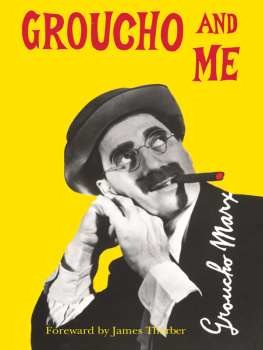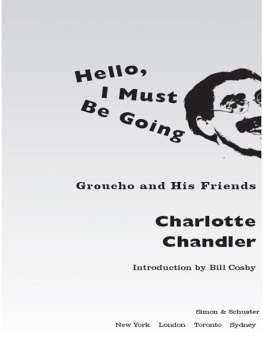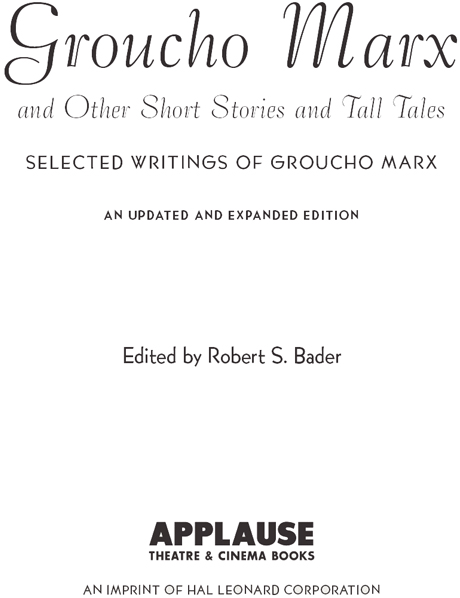
Applause Theatre & Cinema Books
An Imprint of Hal Leonard Corporation
7777 West Bluemound Road
Milwaukee, WI 53213
Trade Book Division Editorial Offices
33 Plymouth St., Montclair, NJ 07042
Collection, Introductions, Editors Note, Notes, and Chronology copyright 1993 and 2011 by Robert S. Bader
Foreword copyright 2011 by Dick Cavett
The acknowledgments on pp. constitute an extension of this copyright notice.
All rights reserved. No part of this book may be reproduced in any form, without written permission, except by a newspaper or magazine reviewer who wishes to quote brief passages in connection with a review.
Updated and expanded edition published by Applause Theatre & Cinema Books in 2011
Original edition published in 1993 by Faber and Faber
Book design by Mark Lerner
The Library of Congress has cataloged the Faber and Faber edition as follows:
Marx, Groucho, 18901977.
Groucho Marx and other short stories and tall tales: selected writings of Groucho Marx/edited by Robert S. Bader
p. cm.
Includes bibliographical references.
I. Bader, Robert S. II. Title
PN 2287.M53A25 1993
814.52dc20 9315821
CIP
ISBN 978-1-55783-921-3
www.applausebooks.com
CONTENTS
Robert Bader should get a medal. Make that two medals.
The first for giving us Groucho Marx and Other Short Stories and Tall Tales eighteen years ago.
Reviews and comments on the original book gave the impression that all people writing about it had conspired to use the phrase A must for the Groucho fan. (Sometimes I ponder the question, What sort of person would not be a Groucho fan?)
The second medal is for the good news thatshould you have missed it beforeBader has not only brought back this wonderful material in this new volume but embellished it with nineteenyes, nineteennew pieces from The Master. I dare you to read any page without laughing out loud.
Theres one new piece in this book that is, as they say, well worth the price of admission. And then some. Its a speech delivered by Groucho in 1952 at the University of Oregon titled Humor from Silent Screen to TV. I found it necessary to divide reading it into two sessions to avoid laugh fatigue. Its almost like coming across an unknown Marx Brothers movie, so abundant are the humor and the wit and the pleasure.
Groucho valued writers above actors and told me that his fondest dream was to be remembered for his writing above all else. (He also told others, of course.)
Julius Marx was a born writer. I have treasured letters he wrote to me that could be used in a writing course at Yale as models of perfect wording, fresh images, deft turn of phrase, high intelligence, and a well-read, educated mans vocabulary. In short, a lively and delightful original style, all of it bathed in incomparable wit. All from that self-schooled man Woody Allen has called the most greatly gifted of comedians.
One of his epistolary traits was the startling, non-sequitur P.S. Heres a prime example. In a letter giving me wise career advice, he closed in the following Groucho manner. Thank God I read all the way to the end.
Yours until hell freezes over,
Groucho
P.S.: Did you ever notice that Peter OToole has a double phallic name?
Mark Twain wrote a hilarious humor piece with a title that would apply easily to Baders Groucho anthology. It was called, A Cure for the Blues.
By sheer chance as I write this, an article in todays New York Times warns of a coming paper shortage. Play it safe and, for birthdays, get extra copies of this book now.
Dick Cavett
FOREWORD TO THE FIRST EDITION
THE SERIOUSNESS OF BEING HUMOROUS
Every comedian at some time or other desires to play Hamlet. Every humorous columnist has, in the bottom of his trunk, a tragic play that some day he hopes to see produced. Just as very few comedians play Hamlet, so very few of these plays are produced. Perhaps it is for the best. However, the point that I am trying to bring out is that all humorists are serious people at heart. The fact that they have to be continually funny makes them so. They also realize that humor is regarded in a light vein, that for a thing to be really worthwhile it must have depth and a certain amount of vitality. Basically their humor contains these qualities and knowing it they endeavor to bring it out in serious material. Generally they fail, for they only know the field of comedy. The path of the drama, the tragic, is new to them and they stumble and fall over strange objects. The same is true of the comedian who ventures into Hamlet.
Well, Im glad the above is over. You know, Im a comedian and I always did want to write something serious, like the rest of the humorists. I guess, after reading it, you will believe what I said about humorists being failures when it comes to the writing of serious material.
Thinking up jokes is by no means an easy task. Im sorry I ever started. I was playing in vaudeville at the time and one night I put a gag of my own in the set extemporaneously. It went over big, but spoiled the scene and Chico almost killed me. However, my vanity was pleased and as I thought of more I added them to the act. Soon I started to contribute wise cracks to humorous weeklies and the leading columnists. It was then that my brothers and I thought that we could arrange our own act. I was using mostly all of my own material and of course Harpo didnt need any lines and the main work of Chico and Zeppo was what is technically known as the business. That was how it started.
Writing humor is mostly the result of habit. After you do it for a while you just cant get away from it and you feel ill at ease when you are not doing it, although you may hate it. After writing humor for a time good jokes begin to occur to you. Then, there is what is known as the wise crack on current topics. This is obtained by following the newspapers and twisting a current event. This work makes a humorist a wide awake fellow. Nothing is going on without his knowing about it.
As soon as a person becomes known as a comedian he becomes a slave to his own humor. Everybody believes that he must be funny at all times, and he tries to live up to their expectations. As for myself, I am always trying to think of new and better jokes. There is not a performance that goes by without my adding at least one new crack.
I have received several good offers to conduct a humor column, but so far have refused them all. I realize how difficult it is to be funny and I believe that the place for me to be funny is on the stage. There I do not have new material for every performance and my voice and mannerisms add to the comedy. Conducting a column I would not have these and I would have to be funny in cold type, and far too often to suit me. Yes, sir, this business of being funny is far too serious. Undertaking is much the more cheerful job of the two. And I do hear that humorists never die of old agethe strain is too much for them.
Groucho Marx
St. Louis Post-Dispatch
November 13, 1927
In a show-business career that spanned over seventy years, Groucho Marx successfully conquered every entertainment medium, becoming a star of the vaudeville stage, Broadway, motion pictures, radio and television. But, as the author of seven books, a play, two film screenplays and over one hundred magazine articles and essays, Groucho quietly conquered another medium, one in which he was as proud to work as any of the others. His writing is often overlooked in studies of his career, perhaps due to the quantity and variety of his other work.

